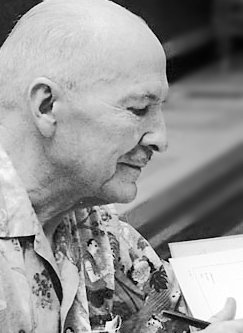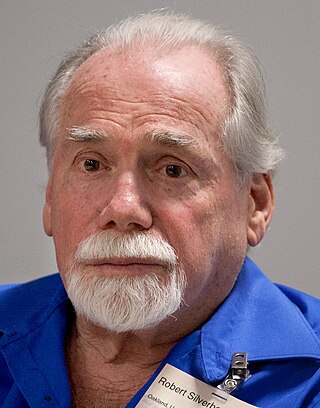Related Research Articles

Hugo Gernsback was a Luxembourgish–American editor and magazine publisher, whose publications included the first science fiction magazine, Amazing Stories. His contributions to the genre as publisher were so significant that, along with the novelists H. G. Wells and Jules Verne, he is sometimes called "The Father of Science Fiction". In his honor, annual awards presented at the World Science Fiction Convention are named the "Hugos".

Robert Anson Heinlein was an American science fiction author, aeronautical engineer, and naval officer. Sometimes called the "dean of science fiction writers", he was among the first to emphasize scientific accuracy in his fiction, and was thus a pioneer of the subgenre of hard science fiction. His published works, both fiction and non-fiction, express admiration for competence and emphasize the value of critical thinking. His plots often posed provocative situations which challenged conventional social mores. His work continues to have an influence on the science-fiction genre, and on modern culture more generally.

Gregory Dale Bear was an American writer and illustrator best known for science fiction. His work covered themes of galactic conflict, parallel universes, consciousness and cultural practices, and accelerated evolution. His most recent work was the 2021 novel The Unfinished Land. Greg Bear wrote over 50 books in total.

Gene Rodman Wolfe was an American science fiction and fantasy writer. He was noted for his dense, allusive prose as well as the strong influence of his Catholic faith. He was a prolific short story writer and novelist, and won many literary awards. Wolfe has been called "the Melville of science fiction", and was honored as a Grand Master by the Science Fiction and Fantasy Writers of America.

Robert Silverberg is an American author and editor, best known for writing science fiction. He is a multiple winner of both Hugo and Nebula Awards, a member of the Science Fiction and Fantasy Hall of Fame, and a Grand Master of SF. He has attended every Hugo Award ceremony since the inaugural event in 1953.

Robert James Sawyer is a Canadian and American science fiction writer. He has had 24 novels published and his short fiction has appeared in Analog Science Fiction and Fact, Amazing Stories, On Spec, Nature, and numerous anthologies. He has won many writing awards, including the best-novel Nebula Award (1995), the best-novel Hugo Award (2003), the John W. Campbell Memorial Award (2006), the Robert A. Heinlein Award (2017), and more Aurora Awards than anyone else in history.

Asimov's Science Fiction is an American science fiction magazine published by Penny Press and edited by Sheila Williams. It was launched as a quarterly by Davis Publications in 1977, after obtaining Isaac Asimov's consent for the use of his name. It was originally titled Isaac Asimov's Science Fiction Magazine, and was quickly successful, reaching a circulation of over 100,000 within a year, and switching to monthly publication within a couple of years. George H. Scithers, the first editor, published many new writers who went on to be successful in the genre. Scithers favored traditional stories without sex or obscenity; along with frequent humorous stories this gave Asimov's a reputation for printing juvenile fiction, despite its success. Asimov was not part of the editorial team, but wrote editorials for the magazine.

Charles David George "Charlie" Stross is a British writer of science fiction and fantasy. Stross specialises in hard science fiction and space opera. Between 1994 and 2004, he was also an active writer for the magazine Computer Shopper and was responsible for its monthly Linux column. He stopped writing for the magazine to devote more time to novels. However, he continues to publish freelance articles on the Internet.
The Hugo Award for Best Short Story is one of the Hugo Awards given each year for science fiction or fantasy stories published or translated into English during the previous calendar year. The short story award is available for works of fiction of fewer than 7,500 words; awards are also given out for pieces of longer lengths in the novelette, novella, and novel categories. The Hugo Awards have been described as "a fine showcase for speculative fiction" and "the best known literary award for science fiction writing".

David Rowland Langford is a British author, editor, and critic, largely active within the science fiction field. He publishes the science fiction fanzine and newsletter Ansible and holds the all-time record for most Hugo Awards, with a total of 29 wins.

Robert David Reed is a Hugo Award-winning American science fiction author. He has a Bachelor of Science in Biology from the Nebraska Wesleyan University. Reed is an "extraordinarily prolific" genre short-fiction writer with "Alone" being his 200th professional sale. His work regularly appears in Asimov's, Fantasy & Science Fiction, and Sci Fiction. He has also published eleven novels. As of 2010, Reed lived in Lincoln, Nebraska with his wife and daughter.
"Jeffty Is Five" is a fantasy short story by American author Harlan Ellison. It was first published in The Magazine of Fantasy & Science Fiction in 1977, then was included in DAW's The 1978 Annual World's Best SF in 1978 and Ellison's short story collection Shatterday two years later. According to Ellison, it was partially inspired by a fragment of conversation that he misheard at a party at the home of actor Walter Koenig: "How is Jeff?" "Jeff is fine. He's always fine," which he perceived as "Jeff is five, he's always five." Ellison based the character of Jeffty on Joshua Andrew Koenig, Walter's son. He declared:
... I had been awed and delighted by Josh Koenig, and I instantly thought of just such a child who was arrested in time at the age of five. Jeffty, in no small measure, is Josh: the sweetness of Josh, the intelligence of Josh, the questioning nature of Josh.

Raymond Fisher Jones was an American science fiction author. He is best known for his 1952 novel This Island Earth, which was adapted into the eponymous 1955 film.
"A Study in Emerald" is a short story written by British fantasy and graphic novel author Neil Gaiman. The story is a Sherlock Holmes pastiche transferred to the Cthulhu Mythos universe of horror writer H. P. Lovecraft. Gaiman describes it as "Lovecraft/Holmes fan fiction". It won the 2004 Hugo Award for Best Short Story. The title is a reference to the Sherlock Holmes novel A Study in Scarlet.
"Born of Man and Woman" is a science fiction short story by American writer Richard Matheson, originally published in the July 1950 issue of The Magazine of Fantasy and Science Fiction. It was his first professional sale, written when he was twenty-two years old. It became the title piece in Matheson's first short story collection in 1954.

Mary Robinette Kowal is an American author and puppeteer. Originally a puppeteer by primary trade after receiving a bachelor's degree in art education, she became art director for science fiction magazines and by 2010 was also authoring her first full-length published novels. The majority of her work is characterized by science fiction themes, such as interplanetary travel; a common element present in many of her novels is historical or alternate history fantasy, such as in her Glamourist Histories and Lady Astronaut books.

Flowers for Algernon is a short story by American author Daniel Keyes, later expanded by him into a novel and subsequently adapted for film and other media. The short story, written in 1958 and first published in the April 1959 issue of The Magazine of Fantasy & Science Fiction, won the Hugo Award for Best Short Story in 1960. The novel was published in 1966 and was joint winner of that year's Nebula Award for Best Novel.

The Nebula Awards annually recognize the best works of science fiction or fantasy published in the United States. The awards are organized and awarded by the Science Fiction and Fantasy Writers Association (SFWA), a nonprofit association of professional science fiction and fantasy writers. They were first given in 1966 at a ceremony created for the awards, and are given in four categories for different lengths of literary works. A fifth category for film and television episode scripts was given 1974–78 and 2000–09, and a sixth category for game writing was begun in 2018. In 2019 SFWA announced that two awards that were previously run under the same rules but not considered Nebula awards—the Andre Norton Award for Middle Grade and Young Adult Fiction and the Ray Bradbury Award for Outstanding Dramatic Presentation—were to be considered official Nebula awards. The rules governing the Nebula Awards have changed several times during the awards' history, most recently in 2010. The SFWA Nebula Conference, at which the awards are announced and presented, is held each spring in the United States. Locations vary from year to year.

The Hugo Award is an annual literary award for the best science fiction or fantasy works and achievements of the previous year, given at the World Science Fiction Convention and chosen by its members. The Hugo is widely considered the premier award in science fiction. The award is administered by the World Science Fiction Society. It is named after Hugo Gernsback, the founder of the pioneering science fiction magazine Amazing Stories. Hugos were first given in 1953, at the 11th World Science Fiction Convention, and have been awarded every year since 1955.

Nora Keita Jemisin is an American science fiction and fantasy writer. Her fiction includes a wide range of themes, notably cultural conflict and oppression. Her debut novel, The Hundred Thousand Kingdoms, and the subsequent books in her Inheritance Trilogy received critical acclaim. She has won several awards for her work, including the Locus Award. The three books of her Broken Earth series made her the first author to win the Hugo Award for Best Novel in three consecutive years, as well as the first to win for all three novels in a trilogy. She won a fourth Hugo Award, for Best Novelette, in 2020 for Emergency Skin. Jemisin was a recipient of the MacArthur Fellows Program Genius Grant in 2020.
References
- ↑ The Locus Index to SF Awards: 2004 Hugo Awards Archived 2011-06-05 at the Wayback Machine